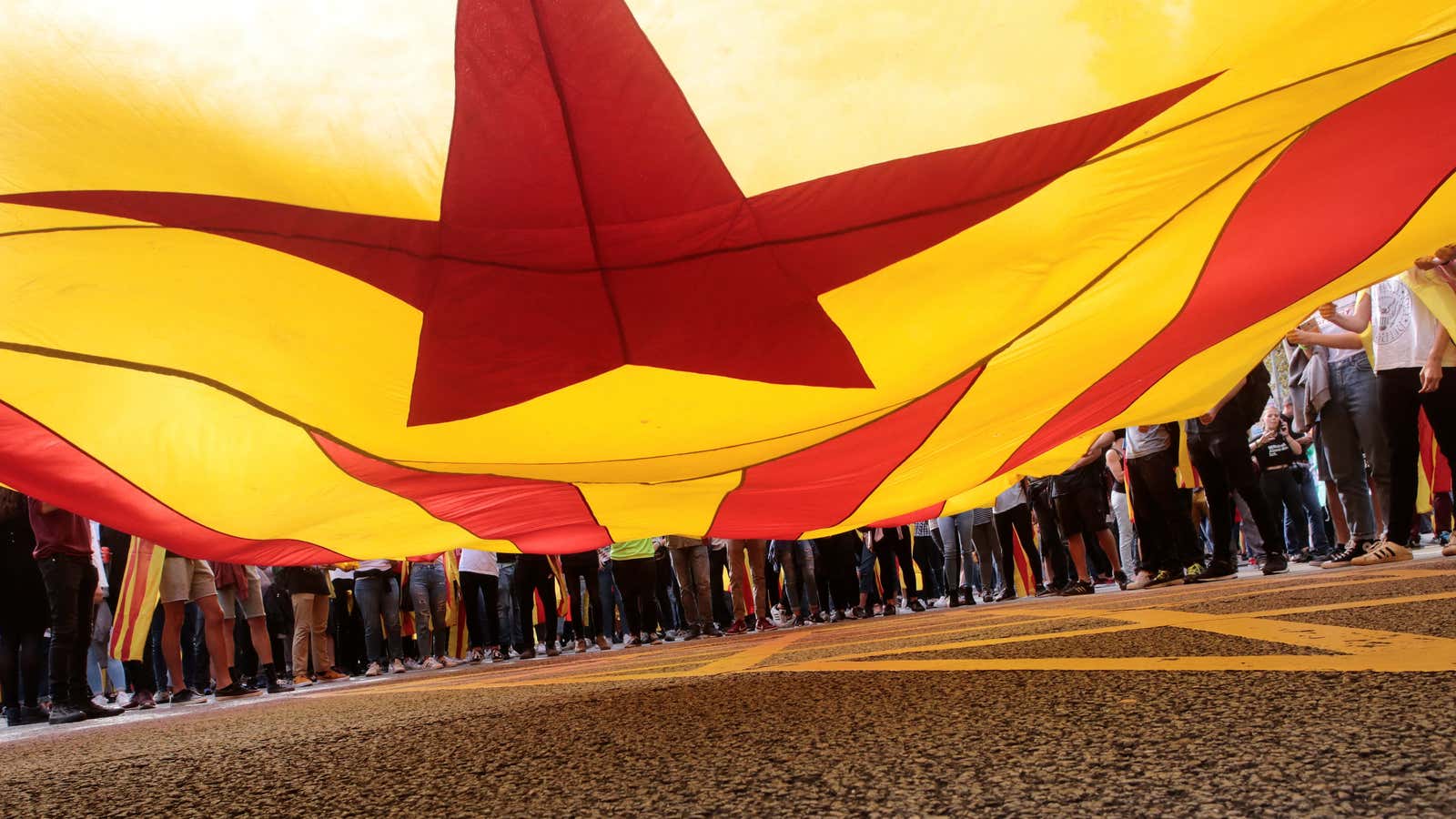Spain and its wealthy northern region of Catalonia have been witness to some remarkable scenes in recent weeks after Catalan leaders decided to hold a referendum on independence Oct. 1.
Instead of fizzling out as it did before, this time the country saw an all-out fight in which the ruling party, courts, the nation’s data protection agency, and Spanish police aggressively took on Catalonians trying to vote in an important, if illegal, process of self-determination. The following day, some 700,000 Catalonians took to the streets.
On Sunday and Monday (Oct. 8 and 9), Catalonians who want to stay with Spain held major rallies, with police putting the number of weekend demonstrators at 350,000, while organizers claimed close to a million turned out. Today (Oct. 10), the separatist leader Carles Puigdemont is seeking to give a big speech where he may (or may not) declare independence.
Here’s a guide to key players in the dispute—and what they can do.
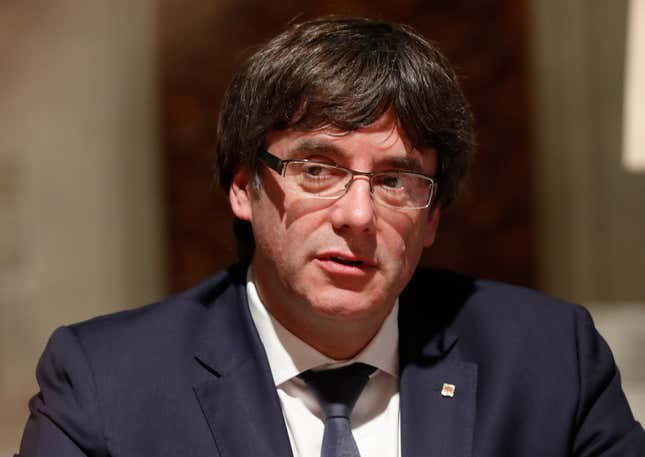
Puigdemont, the 54–year-old leader of the secessionist struggle, and head of the Catalonian government (officially, president of the Generalitat of Catalonia), is from the town of Amer, very close to the border with France. From early on he showed a keen interest in fostering the distinct regional identity of Catalonia, which has strived for more autonomy for most of the time it’s been part of Spain. At college, he studied Catalan linguistics before leaving to join a new Catalan-language newspaper called El Punt, founded in the late 1970s around the time a new Spanish constitution gave Catalonia more autonomy. Later he helped start the English-language newspaper Catalonia Today, as well as a Catalan news agency.
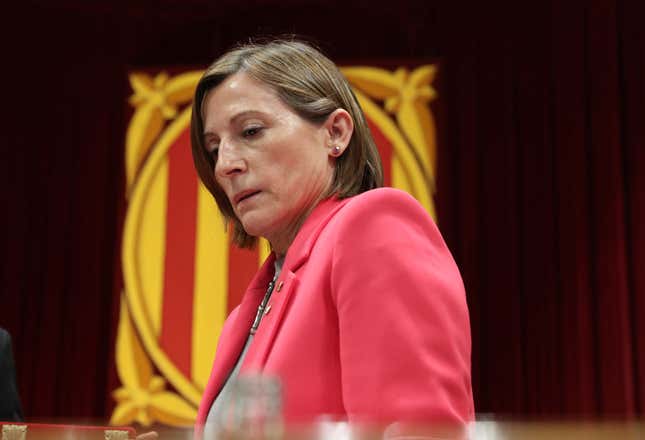
He segued into politics a little over a decade ago, eventually becoming mayor of the ancient city of Girona in 2011. Puigdemont and other Catalonians believe a 2010 Spanish constitutional court decision amounted to reneging on an agreement earlier negotiated under a socialist government to restore more powers to Catalonia.
Along with Puigdemont, other major separatist players include Carme Forcadell, a former TV reporter and Catalan teacher (link in Spanish) who is now president of the Catalonian parliament, and Jordi Sànchez, the head of the Catalan National Assembly, a grassroots pro-independence organization.
After the vote earlier this month, Puigdemont was expected to declare independence at the Catalan parliament yesterday, but Spain suspended the session. He’s now slated to address regional lawmakers today at 6pm local time.
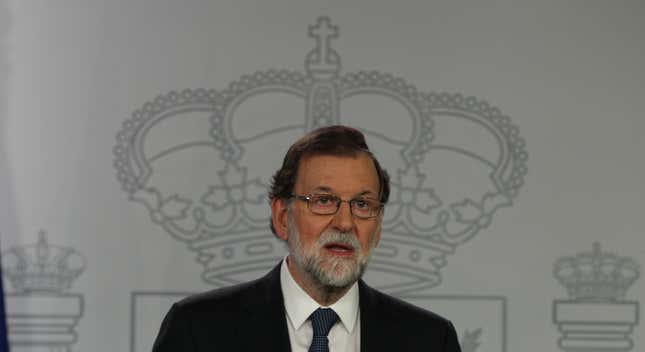
Spanish prime minister Mariano Rajoy, a 62-year-old from northern Galicia who studied law and has been in politics since his 20s, has vowed he will do everything in his power to stop Catalonia from seceding, but has been vague on the details. Rajoy’s center-right Partido Popular has governed since 2011, when it won a landslide victory in the middle of the European debt crisis. The prime minister has reportedly cleared his schedule for the week, apart from attending the annual military parade on Oct. 12 (link in Spanish), when Spain marks Christopher Columbus’s arrival in the Americas.
Rajoy, whom the BBC has called “the patient man of Spanish politics,” for the long years he served in government before finally ascending to the top post, has called for Catalonia to affirm there will be no declaration of independence to avoid “greater evils.” One option open to Rajoy is triggering Article 155 (link in Spanish) of the Spanish constitution, to dissolve Catalonia’s government and call for new elections. But such a hammer blow would likely be counterproductive, and drive people from the “silent majority” (see below) to the side of the secessionists. Other options include issuing a decree (link in Spanish) under a 2015 national security law or doing nothing, to show that the declaration is meaningless, especially as businesses lobby to de-escalate the situation and countries like France have said they won’t recognize an independent Catalonia.
King Felipe VI, Spain’s 49-year-old monarch, is also playing a role. Ahead of the king’s address last week, people in both Catalonia and the rest of Spain had been hoping that the constitutional monarch, a fluent Catalan speaker, could provide a path of unity. Instead, he incensed people in the northern region by roundly scolding them for showing “unacceptable disloyalty” over the referendum push and jeopardizing national harmony and unity, leading many Catalonians to ask, “Who voted for you anyway?” (link in Spanish). The answer is nobody, of course. The king, who represented Spain in sailing at the 1992 Barcelona Olympics, ascended to the throne in 2014 after his father, King Juan Carlos, abdicated.
He is the guardian of Spain’s constitution, and a 2014 poll in Spain’s leading newspaper, El Pais, found a large majority of people were in favor of his playing a greater role in mediating between political parties on national problems. But in general, the king, like his father, allows himself to be guided by the national government, and it seems unlikely Catalan separatists would accept him as a moderator. Last year, he declined to meet Forcadell, of the Catalan parliament, after the incoming regional government did not swear allegiance to him.
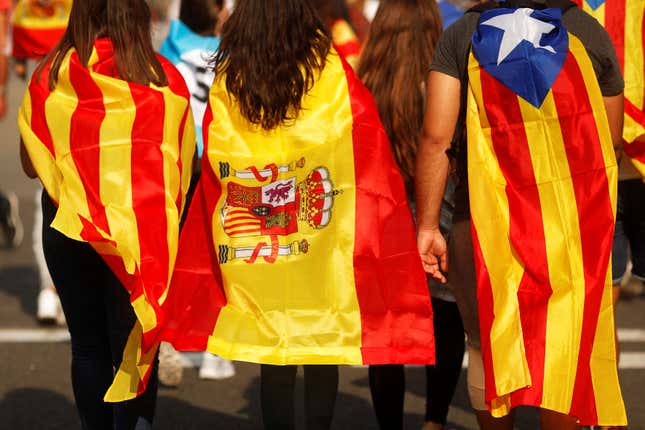
The Catalan people. In a province of 7.5 million, some 2.2 million managed to vote, 90% of them for independence. But the separatists aren’t speaking for everyone. A segment being referred to as “silent Catalonia” held rallies on Sunday and Monday to call for staying united with Spain. Until recent days, it’s been harder for them to stir up grassroots support, in part, they say, because of harassment at university campuses.
Many supporters of staying in Spain tweeted pictures of the unity protests with the hashtag #RecuperemElSeny (Let’s restore sanity). So did state entities such as the national police, accused of causing more than 900 injuries on Oct. 1. People in Catalonia also noted that at least some of the protesters who had traveled from other parts of Spain to participate made a nuisance of themselves while in Barcelona.
The Spanish people. Again, the silent majority is, well, silent—though it’s likely most Spaniards want Catalonia to stay. Some parts of Spain apparently held rallies in support of the region’s right to hold a referendum, according to a retweet from Puigdemont. But Spaniards who rallied for unity this week didn’t do their cause much good by accompanying their slogans with fascist salutes. The new leftist political party Podemos, which saw a surge of support in the 2015 and 2016 elections, supports allowing Catalonia to have a referendum, as a way to enable a frank dialogue that would feed into some kind of negotiation with the national government, rather than be binding. In September Podemos participated in a protest in Madrid against the actions the Spanish government was taking to stop organizers from holding the vote.
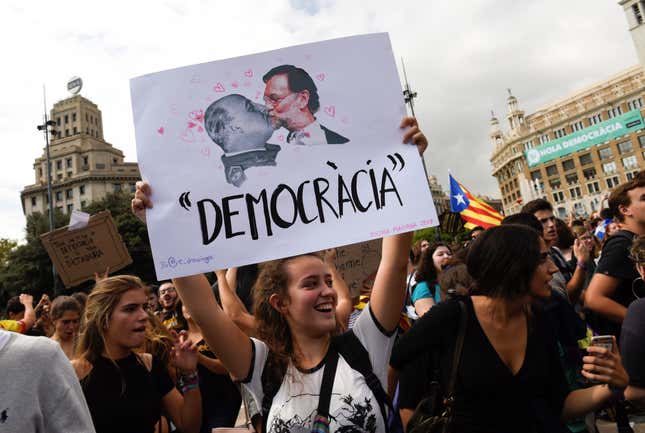
Francisco Franco, the Spanish general who ruled Spain with an iron fist for more than three decades, remains strangely undead in Spanish politics 40-plus years after his death. One reason for this was a pact to move forward after Spain’s return to democracy, and not seek to punish politicians for wrongs committed under Franco. But Franco’s rule has strongly colored how the Catalan region reads any perceived efforts to diminish its say over promoting its language or discussing a future outside of Spain. An important part of the restoration of democracy was that Catalan, a stronghold of republican resistance to Franco, saw a flourishing of its language after its institutional use had been banned under him.
A key Catalan pro-independence organization, Òmnium Cultural, whose slogan is “language, culture, country,” was founded in the Franco era. The astonishing violence of the Spanish police on the day of the referendum earlier this month also carried echoes of that dark past, when tens of thousands who opposed the repressive state were killed. On top of all that, a spokesman for Spain’s ruling party has warned (paywall) that Puigdemont could end up like another Catalan leader who declared independence in 1934. That’s Lluis Companys, who was jailed and shot under Franco.
